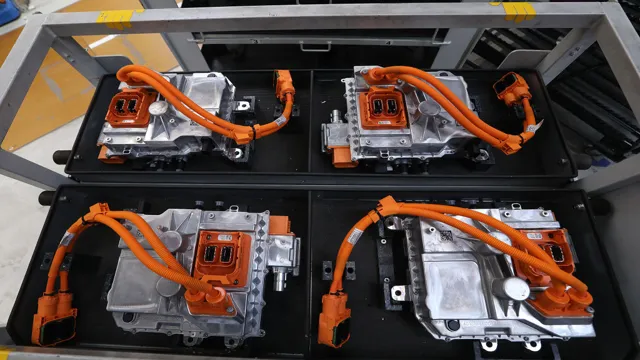Rev Up Your Ride with Car Electric Battery Load: The Ultimate Guide
Has your car battery ever died unexpectedly, leaving you stranded and frustrated? You’re not alone – it’s happened to the best of us. But did you know that regular car battery load testing can help prevent these types of situations from occurring? In this blog post, we’ll dive into the importance of car battery load testing and why it should be a regular part of your car maintenance routine. By the end of this post, you’ll have a better understanding of how load testing works and why it’s crucial for ensuring your car battery stays in good condition.
So buckle up and let’s dive in!
Understanding Battery Load Testing
When it comes to car electric batteries, load testing is an important process to ensure their efficiency and longevity. Load testing involves assessing the battery’s ability to deliver voltage and current under a specific load for a fixed duration of time. This helps identify any potential weaknesses or defects in the battery that can hinder its performance.
By subjecting the battery to an electrical load, it allows for a more accurate reading of its condition rather than simply measuring its voltage. A properly functioning battery should be able to sustain a load without dropping its voltage significantly below the manufacturer’s recommended level. Therefore, load testing can help prevent unexpected battery failure and potentially save you money by identifying issues early on.
What is a Car Battery Load Test?
Car Battery Load Test Car battery load testing is the process of determining if a car’s battery is working at its full capacity. It is essential to know if your battery is weak, as it can cause a lot of issues while driving. A load test measures the amount of power a battery can deliver under certain circumstances.
The battery is discharged while a load tester measures the voltage drop to determine the battery’s capacity. A weak battery can make it hard to start the vehicle, and it can fail unexpectedly, leaving you stranded. A load test can help identify potential issues before they become a significant problem.
So, if you’re experiencing difficulty starting your car or the battery dies frequently, it might be time for a load test. It is recommended to get your battery tested regularly to ensure it is working correctly and prevent any issues on the road.

Why is it Important to Test Your Car Battery Load?
Car Battery Load Testing Car battery load testing is an essential part of maintaining the health of your car’s battery. The test checks the battery’s capacity for holding a charge, ensuring that it can provide the necessary voltage to start your vehicle smoothly. It’s vital to perform regular battery load testing because it gives you a clear indication of when your battery needs a replacement.
A weak battery can cause your engine to crank slowly, and you may also experience electrical problems. Usually, professional mechanics perform the load test with a specialized tool, which applies a controlled electrical load to the battery. The battery’s response is then assessed to determine its overall condition.
The technician can identify how much power the battery can deliver while under constant electrical load. The battery load test can identify defects in the battery, which cannot be detected through other means such as visual inspections or voltage tests. In summary, battery load testing is crucial to keep your car battery healthy and prevent you from unwanted car breakdowns.
It allows the technician to determine your battery’s capacity for holding a charge, and the battery’s response under load. If your battery doesn’t pass the test, then a replacement would be necessary. Regular battery load testing will help ensure your car battery is always in good condition, which will significantly reduce the likelihood of it failing unexpectedly.
Factors that Affect Car Battery Load
Car electric battery load is a critical factor that determines the overall efficiency of your car. There are several factors that affect the load on your car’s electric battery, such as the number of electrical components in use, the age of the battery, and the current weather conditions. When using various electrical components like headlights, air conditioning, or audio systems simultaneously, it can lead to a high battery load.
Additionally, older batteries are more likely to have a higher load than newer ones, as they tend to degrade over time. Lastly, temperature extremes, such as hot summers or cold winters, can impact the battery load. Therefore, it is essential to ensure that your electrical components are not overused, and your car battery is well-maintained to ensure optimal load conditions.
Temperature and Car Battery Load
Car Battery Load When it comes to car batteries, their load can be affected by a variety of factors. One of the most significant factors that can affect car battery load is temperature. Extreme temperatures, both hot and cold, can have a significant impact on a car battery’s ability to hold a charge and provide power to the vehicle’s systems.
High temperatures can cause the battery fluids to evaporate, which can damage the battery’s internal components and decrease its lifespan. On the other hand, cold temperatures can cause the battery to lose its charge more quickly and reduce the amount of power it can provide. Other factors that can affect car battery load include the age of the battery, the frequency of use, and the amount of electrical equipment in the vehicle.
By understanding the factors that can affect car battery load, drivers can take steps to maintain their batteries and keep their vehicles running smoothly.
Age and Car Battery Load
Age is one of the significant factors that affect car battery load. As batteries age, their capacity to hold a charge diminishes. Thus, an older battery might have a hard time sustaining a decent charge needed to power a vehicle.
Another factor is the load that your car puts on the battery. The load is the amount of power that is drawn from the battery to operate the engine and other electrical components. Higher loads mean that the battery will be drained faster, and ultimately, a car that demands more power from the battery may experience a shorter battery life.
Having regular maintenance check-ups on your vehicle can help you know more about the factors that affect your battery load. Keywords like “car battery load” can help you efficiently search online and find tips to prolong the life of your battery, including reducing load and other strategies. By understanding the factors affecting your car battery load, you can extend your battery life, ensuring reliability and safety on the road.
Usage and Car Battery Load
Car battery load is a crucial consideration for car owners. It refers to the amount of electrical power required to start and operate a vehicle’s engine and other components. Several factors can impact the car battery load, including the number of electrical accessories in the car, such as radio, air conditioning, and navigation systems.
The age of the battery is another crucial factor that can directly impact its ability to maintain an optimal charge level. Temperature also plays a role in determining battery efficiency, as extreme hot or cold environments can affect battery life expectancy. Proper maintenance, such as keeping the battery clean and secured in its place, can help reduce the strain on the battery and prolong its life.
Additionally, the frequency of vehicle usage can also impact battery life, as regular and frequent usage can help keep the battery charged and maintained. Overall, it is essential to consider these factors to ensure the proper usage and maintenance of car batteries and prevent unexpected battery failure, which can be a frustrating or inconvenient experience for car owners.
How to Test Car Battery Load
Testing the load of a car’s electric battery is an essential task for any car owner or mechanic. It’s important to know whether your battery is capable of starting your car or if it needs to be replaced. One way to test the battery load is by using a voltmeter.
First, turn off all the electrical components in your car and then connect the voltmeter to the battery terminals, making sure to connect the positive lead to the positive terminal and the negative lead to the negative terminal. The voltmeter should read between 14 and 1
7 volts for a fully charged battery. If it reads below 12 volts, the battery may need to be recharged or replaced.
Another way to test the load is by using a battery load tester. This tool discharges the battery while measuring its voltage and can provide a more accurate reading of the battery’s condition. By regularly testing the load of your car’s electric battery, you can ensure that your car starts reliably and avoid being stranded with a dead battery.
Using a Multimeter to Test Car Battery Load
Testing car battery load is an essential aspect of every car maintenance routine. Thankfully, it is a simple operation that you can easily undertake with the help of a multimeter. To test the car battery load using a multimeter, first, make sure that the engine and all electrical in the car are turned off.
Next, set the multimeter to a DC voltage setting, then connect the red lead of the multimeter to the positive terminal of the battery and the black lead to the negative terminal. After that, turn on the multimeter and check the reading. Ideally, the reading should be between 1
4 and 17 volts for a fully charged battery. If the reading falls within that range, the battery is good.
However, if it is less than 14 volts, that indicates the battery is not sufficiently charged. Conversely, if it exceeds 1
7 volts, that means the battery is overcharged and may get damaged. Testing your car battery load will help you avoid getting stranded due to a dead battery, and enable you to address any underlying issues before they escalate.
Testing Car Battery with a Load Tester
Testing car battery load is an important step that every car owner should take to ensure their battery is functioning efficiently. A load tester is a tool that is used to measure the amount of electrical load that a battery can handle. This test is important because it provides information on whether or not the battery can deliver the power needed to start the engine and run the car’s electrical components.
To test your car battery’s load, you will need to connect a load tester to the battery and turn on the engine. Once the engine is running, you should increase the load on the battery by turning on the headlights and the heater. The tester will then display the voltage level and the amount of load the battery can handle.
If the voltage drops significantly or the battery cannot handle the load, you may need to replace the battery. By testing your car battery’s load, you can ensure that your car is running smoothly and avoid any unexpected breakdowns on the road.
Maintaining Your Car Battery Load
Maintaining the load on your car’s electric battery is essential to ensuring that your vehicle is running smoothly and efficiently. The battery is responsible for providing the power needed to start the engine and run all of the electrical components in the car. Without a properly functioning battery, your car won’t start or may experience a loss of power while driving.
To maintain the load on your battery, it’s essential to keep it charged and in good condition. Regularly checking the battery’s charge level and ensuring that it’s properly connected can help prevent damage and extend the life of the battery. One tip for maintaining battery load is to avoid letting the battery completely discharge, as this can cause irreversible damage.
Keeping the battery fully charged and replacing it as needed can help ensure that your car continues to run smoothly and efficiently. So, the next time you’re taking care of your car, don’t forget to pay attention to the battery!
Regular Maintenance Schedule
Maintaining your car battery load is a critical part of your regular maintenance schedule. Your vehicle’s battery is responsible for firing up the engine and powering all of the electrical systems in your car, so taking care of it is crucial to ensure your vehicle runs smoothly. One way you can maintain your car battery is by checking its load.
Load testing allows you to determine whether your battery can hold a full charge and whether it can start your car in cold weather. Testing the battery’s load can prevent you from being stranded on the side of the road. It’s essential to have your battery load tested regularly, especially if you’ve noticed any signs of a weak battery, such as dimming headlights or a slow engine crank.
By maintaining your car battery load, you can save yourself time, money, and the stress of dealing with a dead battery.
Tips to Keep Your Car Battery in Good Condition
Maintaining your car battery is essential to ensure your vehicle runs smoothly and doesn’t leave you stranded on the side of the road. One important aspect of keeping your battery in good condition is maintaining the load. This refers to the electrical demands being placed on the battery, which can vary depending on factors such as weather, driving habits, and accessories being used.
To maintain the load on your battery, make sure to turn off any unnecessary electrical components when your car is not running and avoid leaving them on for extended periods. Additionally, you can invest in a battery charger to keep the battery charged and a volt meter to monitor its voltage levels. By taking proactive steps to maintain the load on your car battery, you can ensure it lasts longer and performs at its best.
Conclusion
In conclusion, the load placed on a car’s electric battery can be compared to the weight of a backpack on a hiker. Just as a heavier backpack requires more energy and effort to carry, a higher electric load will drain the battery faster. So, next time you’re taking a road trip or simply running errands around town, remember to pack light and keep your car’s electric load in check to ensure a smooth and sustainable journey.
“
FAQs
What is a car electric battery?
A car electric battery is a rechargeable battery that powers the electric motor of an electric vehicle.
How long does the car electric battery last?
The lifespan of a car electric battery depends on several factors, such as the quality of the battery, how often it’s charged and discharged, and how it’s maintained. Generally, electric car batteries have a lifespan of 8 to 10 years.
What is the load on a car electric battery?
The load on a car electric battery refers to the amount of electrical energy that is drawn from the battery to power the car’s electric motor. The load can vary depending on different factors, such as the speed of the car, the terrain, and the weight of the vehicle.
How can I extend the life of my car electric battery?
To extend the life of your car electric battery, make sure to keep it charged at the appropriate level, avoid letting it discharge completely, and store it in a cool and dry place. It’s also important to schedule regular maintenance checks with a qualified technician to ensure it’s functioning properly.






